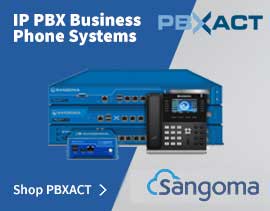Digium Wildcard TE220 PCI Express ISDN PRI Card
The Digium TE220 is a high-performance, cost effective digital telephony interface card with the power to create a seamless network, interconnecting traditional telephony systems with emerging Voice over IP technologies.
Used in conjunction with Asterisk, the Digium TE220 can be used to deliver a wide range of PBX and IVR services to the network or handset including Voicemail, Call Conferencing, Three-way Calling, and VoIP Gateways. The Digium TE220 is a double span, selectable T1 (24-channel per port), E1 (32-channel per port), or J1 (24-channel per port) card utilizing Digium's VoiceBus technology. VoiceBus technology allows the Digium TE220 to use an industry standard bus-mastering PCIe interface, as found in millions of PCs worldwide, to maximize system compatibility and eliminate system conflicts.
The Digium TE220 supports both voice and data modes on its double span, for example, the card can support (per port) 12 channels dedicated to voice, routed directly to the Asterisk Open Source PBX, and 12 to data, handled by the underlying Linux operating system, thus eliminating the need for an external router. The Digium TE220 works in X1 PCIe 1.0+ slots. The bus-mastering Digium TE220 improves I/O speed over slave-only architectures, resulting in reduced CPU usage and increased card density per server. The cards provide the power to interconnect traditional telephony systems with emerging Voice-over IP (VoIP) technologies.
Target Applications
- Legacy PBX/IVR Services
- Voice-over Internet Protocol (VoIP) services
- Complex IVR Trees
- "Meet-Me" Bridge Conferencing
- VoIP Gateways (supports SIP, H.323 and IAX)
- Calling Card Platforms
- Voice/Data Router (replace expensive routers)
- PRI Switch Compatibility – Network or CPE
By utilizing Digium's TDMoE (TDM over Ethernet) technology, an exclusive Digium process, you can easily connect multiple PCs equipped with the Digium TE220 and achieve voice quality on par with single PBX implementations. Scalability for this product is derived from adding multiple Digium TE220 cards to each individual PC adding additional cards as you need them for your expanding applications. The Digium TE220 supports industry standard telephony and data protocols, including both RBS and Primary Rate ISDN (PRI) protocol families for voice and PPP, Cisco HDLC, and Frame Relay data modes. The board drives both line-side and trunk-side interfaces, including call features. The Digium TE220 supports industry standard telephony and data protocols, including Primary Rate ISDN (both N. American and Euro Standard) protocol families for voice, PPP, Cisco HDLC, and Frame Relay data modes. Both line-side and trunk-side interfaces are supported, as well as advanced call features.
Improving upon the prior models which did not offer expansion capabilities, the Digium TE220 may be combined with Digium's VPMOCT64 echo cancellation module to deliver 128ms of echo cancellation across 64 channels in E1/T1 modes.
The Digium TE220 has been designed to be fully compatible with existing software applications. They are fully integrated with Digium's Asterisk software. The open source drivers for these cards support an API for custom application development. With the combination of Digium hardware and Asterisk software, numerous telephony configurations are possible. From the traditional PBX to VoIP Gateways, Digium solutions are paving the way for a new generation of worldwide communications.
Digium TE220 Technical Specifications
Hardware
- Ports: 2 x E1/T1/J1 PRI
- Bus Type: PCIe 1.0+
- Connector: X1
- Processor: 32-bit 33MHz
- Echo Cancellation: VPMOCT64 (not included)
Minimum Hardware Requirement
- 800-Mhz Pentium III
- 64MB RAM
- Available PCIe 1.0+ Slot
Framing Types
- Superframe (D4)
- Channel Associated Signaling (CAS)
- Common Channel Signaling (CCS)
Coding Types
- Alternative Mark Inversion (AMI)
- Bipolar with 8 Zeros Substitution (B8ZS)
- High Density Bipolar of Order 3 Code (HDB3)
- Optional Cyclic Redundancy Check 4 (CRC4)
Primary Rate Interface (PRI) Switch Types
- National ISDN 1 (NI1)
- National ISDN 2 (NI2)
- Nortel DMS100
- AT&T 4ESS
- Lucent 5ESS
- EuroISDN Q.931
- Q.SIG (Limited Support)
Signaling Types
- E&M, E&M E1, E&M Wink
- Feature Group D (DTMF)
- Feature Group D (MF)
- Feature Group D (Tandem Access)
- Feature Group B
- Feature Group C-CAMA
- Feature Group C-CAMA (MF)
- Foreign Exchange Station (FXS) Loop Start, Ground Start, Kewl Start
- Foreign Exchange Office (FXO) Loop Start, Ground Start, Kewl Start
- PRI Network and CPE
Physical
- Dimensions: 12.7x9.53x1.6 cm
- Full-Height: Yes
- Half-length: Yes
- Temperature: 0 to 50° C
Regulatory
- RoHS compliant
- Manufactured in an ISO 9001:2001 certified facility in the United States
- Maintain an MTBF greater than 1 million hours












